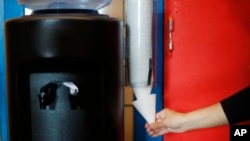The Detroit school district will install hydration stations at all its schools after more than half tested positive for high levels of copper and lead in the water.
The school board on Tuesday approved $3 million for the installations but said most of the money would come from private donors and community organizations.
Tests conducted earlier this year found 57 schools had elevated levels of copper and lead in the water; 17 others are still being tested. There are 106 schools in the Detroit school district.
City officials have blamed old fixtures for the contamination. Until the installation is completed, bottled water will be provided to affected schools to "ensure there is no lead or copper in all water consumed by students and staff,'' Superintendent Nikolai Vitti said.
The school district will replace more than 800 drinking fountains with the hydration stations, which it said is a long-term solution to the problem.
The hydration stations use filtration technology to cool water and remove lead, copper and other contaminants.
Vitti said the installation should be complete by the end of next summer.
This is not the first time Michigan has been plagued by water contamination. In 2014, the city of Flint switched its water supply to save money. It failed to ensure that water from the Flint River had been treated with anti-corrosion agents, as required by law. The city's old water mains corroded, turning drinking water brown with iron contamination, and lead leached from smaller pipes that carried water into homes.
In all, nearly 100,000 people were affected by the contaminated water. Federal health officials found that young children in Flint had significantly higher levels of dangerous lead in their blood.
Health officials say elevated exposure to lead can cause health and behavioral problems in children because their developing brains and nervous systems are more sensitive. Exposure to copper can cause gastrointestinal problems in some children.






